[Below are the second installment of my prepared remarks for Day One of the Liberty Food Fest in Bellows Falls, which, of course, bear little relation to what I actually said. My references to Joel are to my fellow speaker and ally Joel Salatin, who spoke before me at the Liberty Food Fest. Thanks to Amy Hornblas for the audio recording: details of her work are below.]
The recording of my talk is as much a comedy show as a farming spiel… :)
Part Two:
….Let’s talk a little bit about sheep, hay, and community. I was a practicing litigation attorney when I was destroyed by Lyme Disease (for which I took hydroxychloroquine for ten years, so please don’t tell me how dangerous that anti-viral is). I had lived all over the world, but when I lost my health, I decided to move to Vermont and farm. I needed to keep moving, and I had to work. Little did I know what I was doing, and I’m so glad I didn’t know. I relate this story in my first book, but here I want to relate some content absent from the book.
We bought a 150-acre former dairy farm near the Canadian border in the NEK. I had never made a bale of hay or raised a cow. And so I learned how to make hay, and how to raise sheep. First, I want to contrast sheep with other animals. Why would people raise sheep? There is wool, milk, or meat. Sheep, cows, goats, pigs, chickens – all are different. Different feeding, breeding, diseases, stomachs, fencing, behaviors. Our first goal as new farmers was simply to learn how to make hay and then keep things alive. There is no profit in dead animals.
I didn’t learn how to make hay by telling the locals how to do it, any more than I learned law by telling lawyers how to do it. Humility and farming are inseparable, though you will note there is an incredible sort of pride and determination in farmers that accompanies this way of life. My neighbors helped me learn to make hay, and I learned also about what neighbors are.
Subscribe to Small Farm Republic to unlock the rest.
Become a paying subscriber of Small Farm Republic to get access to this post and other subscriber-only content.
Farmers and those around them form three vital human foundations:
– economy
– community/culture
– health
This is not just true in Vermont, but around the nation and world. If you eliminate the farmers, you undermine all three. This is observable in our inner cities. It is very sad.
I raise sheep because 1) I like to eat lamb; 2) I am hay-dependent rather than grain-dependent; 3) there is growing market demand: the market price was $2.40/pound in 1999 (hay was $2); in 2024, it is $8-10/pound and climbing ($5/bale for hay). Sheep give me two lambs annually that grow to eating size in six-eight months; cows give me one animal a year that takes two years to reach maturity. Cows are cheaper to feed, easier to manage, more rugged healthwise, and more profitable. However, slaughter ease and scale favor sheep. (I can’t take a cow to the slaughterhouse in a VW bug).
Nowadays, most Vermonters have never eaten lamb, let alone mutton. I picked up a love of lamb in the UK, not from my Vermont forebears. How very quickly the entire economy, culture, self-reliance, and food health can shift or vanish – just a few brief generations and Vermont has replaced its Merino sheep with human flatlander sheep that think bureaucrats and corporations can be trusted with their food supplies, and that tourism and a massive state government bureaucracy can properly replace an agrarian economy and culture. Vermont is dying – Vermont is being slaughtered, dismembered, denigrated, racialized, and destroyed. Its agri-culture is being systematically eviscerated.
Whether or not that is the plan, let me explain to you the inevitable result. It is the fall of Rome, the chairs on the Titanic’s tipping deck slipping fast toward the ocean, the death of human culture and health. It is a slow self-immolation not just of farming and Vermont’s traditional culture, but of what it is to be human.
This is why I drive around the Green Mountains collecting hay for my sheep. We have 33 ewes so we needed about 1500 square bales this year, at about 60 bales a trip in my pick-up. I don’t carry equipment and fuel costs and real estate taxes anymore – I pay these indirectly through the farmers by buying their hay. Finding good quality hay and getting it into the barn is like prospecting these green hills. I meet old Vermonters on dead-end dirt roads. I drive to towns and over back roads I never heard of, meet old-timers and hear their stories. We barely break even on our sheep sales – but do we “measure out our lives in coffee spoons?” (This is a reference to TS Eliot’s The Love Song of J Alfred Prufrock, in which Eliot reflects upon the meaninglessness of a materialistic way of life in which people measure everything by its economic worth.)
This is where my Grammie was wrong. Yes, she had suffered poverty like I can barely imagine, and yes money buys food. But Grammie never lived in the NYC or Connecticut suburb she counseled her children to go live in, for money. We raised our children poor on our farm up in Barton, Vermont, but the character-building was priceless and unavailable in any private school. We scrape by to make our car payment each month, but our freezers are stocked with animals we raised from birth to death, fed local hay to support our local farmers and agri-culture. The entire money supply will evaporate in hyperinflation one day, but sheepskins will still keep us warm, and the meat in our barn walks around unrefrigerated until we need it.
(Newborn twins!)
My sheep keep me fit. I move their hay, manure, meat, wool, and water.
My sheep keep me humble. They keep me humble when they live, and when they die. They keep me humble in their perpetual dependence on me. I am not an abuser and enslaver of animals. I am a husbandman, a servant. I must keep them alive and healthy so that I can slay them ethically and gratefully. That is a connection that most of humanity has lost – at its peril.
My sheep keep me sane. The physical labor, the periodic pauses to feed and care for them – they are like reboots throughout the day. They compel us to step out of our worldly cares – no matter how dire – and come down to earth with them. They need hay, water, shelter. So do we, but the animals always must come first. And in their needs we become acutely aware of our own.
My sheep keep me fed. If the world ended tomorrow, I can keep feeding sheep like my ancestors in these hills did 200 years ago (at least until I ran out of hay.) This, I suspect, is why the globalists are coming after cows – they control the pigs and chickens because they control the grain. They don’t much care about sheep because the world (and the US) are not as dependent on them. But both sheep and cows can be raised on grass only. Imagine when hyperinflation hits energy supplies or the currency how much that will turn beef production upside-down!
(Lamb rescue time!)
But wait, I want to keep raising sheep without industrial grains, but I buy my hay from old farmers. Where are the new young farmers? Who can afford to preserve and productively maintain farmland with taxes and property prices so high? This is roiling Ireland and England – it is roiling Vermont as well.
When Ray Churchill, Wes Snow, and the hundreds of other retired dairy farmers no longer bale hay, or the horse people buy it all up for $12/bale (something that has been happening for years in California), how will I continue to raise my sheep? I am getting old too – where are the young people to embrace and preserve this knowledge, and where will our society be in just one or two more generations without them and their knowledge?
“We will have lost our sheep, and in the bargain we will have become lost sheep.”
I will tell you where we will be – we will be indistinguishable from the confinement-fed “livestock” we have reduced to factory widgets raised solely for profit. We will have lost our sheep, and in the bargain we will have become lost sheep. We will have lost our Vermont economy, culture and community, and our mental and physical health. Much like those confined animals, we won’t even know any longer what we have lost, or that there is a freedom outside the industrial food monolith. That freedom may be arduous, even adversarial. But that freedom only comes with those burdens – the burdens of farming. It cannot be, nor should it be, any other way. All other ways lead to pride, ignorance, and dependency.
So that is where we are. I have been torn between these two poles my entire life – the polished city and concrete solidness of sidewalks, office cubicles in high rises, computers that make everything “easier,” versus ramshackle barns, the smell of wood smoke and old sweat, lowing cows and steaming piles of manure. One of them is the real world, present throughout all human history. The other is a brief blip enabled by hubris, cheap energy, and technology – all three of which face imminent limits not present for peasant agriculture.
(Ba-a-a-a-a-a-a-a-a!)
This is the historical arc in which we find ourselves. The old farmers like Grammie have written off their own worth, and have been forced to measure their life in dollars and cents – with coffee spoons, if you will. Modern humans are isolated, alienated, depressed, anxious, self-harming with addicition and suicide. Like confused animals in tight cages, they lack any collective memory of WHY.
The old farmers moving hay, and the content sheep ruminating over their contemplative cud, are the signposts back to human health: physical, mental, and spiritual health. There is no way to take a pill to replace exercise; no pill to replace arduous work with machine labor – in either case, do we really want to do that? Isn’t the cost much greater than we realize, because we don’t know any better?
Those sheep and old hay farmers will teach you much about yourself that you never even knew you didn’t know. And as grocery prices rise along with human alienation and preventable diseases, those sheep will not save us from ourselves – we must save them as part of that ancient symbiosis without which we have never been able to fend for ourselves. The same for chickens, pigs, and cows – we have debased ourselves with the industrial enslavement of our “livestock,” and we are slowly but inexorably shifting our human kind into a similar dystopian imprisonment.
The American Revolution could not have been won without food. Stalin, Mao, and Pol Pot have shown what happens when government controls all the food. Siege warfare has a long history well predating Rome. Food has always been a weapon, or a healing – we humans stand in between as arbiters of which one it is. But if we take humans – and sheep, and hay – out of the equation, we abandon all self-determination and hope for liberation. Abandon all hope ye who enter the industrial “here.” We are there.
I recall a Bernie supporter calling to reeducate Americans in a secret video recording, with styrofoam-packaged take-out meals stacked on a table in front of him. This person was a staunch Marxist oblivious about farming and food and his own dependency on them. There is no revolution without food. Left or Right, right or wrong – food is a fundamental human need and modern humanity has unmoored itself from its food supply, its microbiome and soil health, and thus its food security. There is no revolution without these old farmers and their knowledge and pastures that connect me to my animals and my own health. It is a network, a vital jugular that is increasingly sclerotic.
Farmers are radicals; sheep (and cows) = independence! Food Liberty is Liberty!
(Bottle-feeding an orphan (named Mable) with raw Jersey milk — border collie Bea ensures not a drop hits the ground….)
Law v food
Here’s a law for you: he with the most toys can die of starvation. He who has food can dictate the law. The farmer will eat while the lawyer chews on his starched shirts and the investment banker gnaws her Rolodex. There is no law, no civilization, no pursuit of happiness, without the food that this society has taken for granted more than any society in human history. The resulting lack of humility and gratitude – and awareness – has seeded a future that will likely be harder and more arduous than anything my Grammie Cesarine ever endured. The Fall of Rome was a civilized power transfer in contrast with what the fall of America and modern agriculture will be if we do not reverse course sharply and with grave deliberation.
Thank you for your time and commitment to attend this event. I hope you feel less sheepish, as in less in the dark or helpless about your food choices, than before you sat down.
Audio credit:
The 5 H Show Celebrates Health, Happiness, Harmony, Humor and Humanity
Hosts Geri Proccachini and Amy Hornblas discuss issues related to The 5 H’s with neighbors from the Mad River Valley in Vermont, across New England- and beyond.
The 5 H Show is produced at a community radio station in Warren, Vermont. Listen Live, and also check out the other Great Programming on WMRW: wmrw.org
A collection of previous episodes of The 5 H Show are also free for download at AMYVT.COM


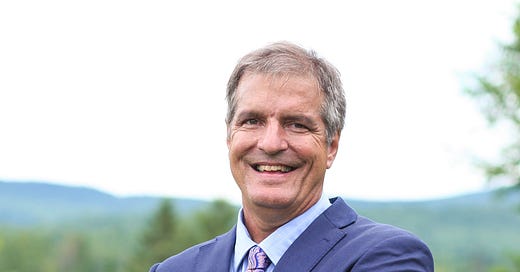



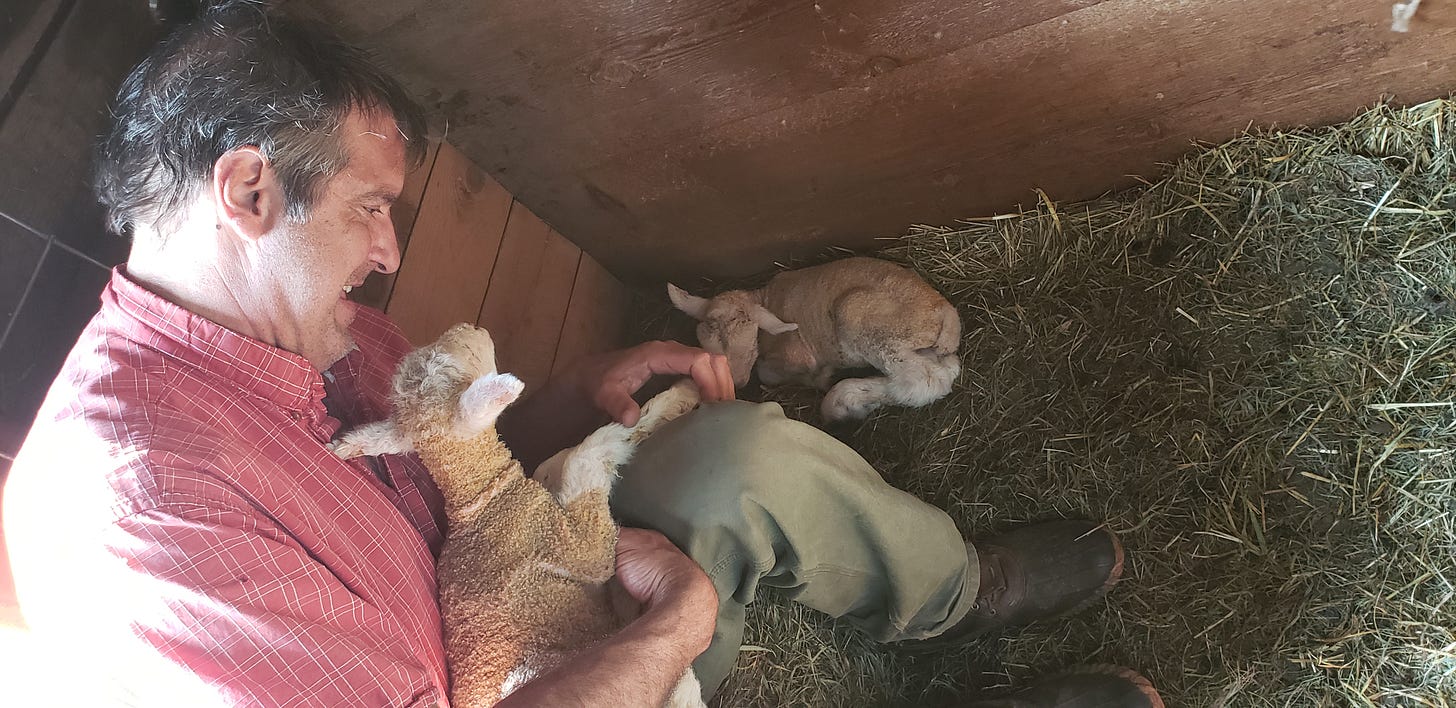
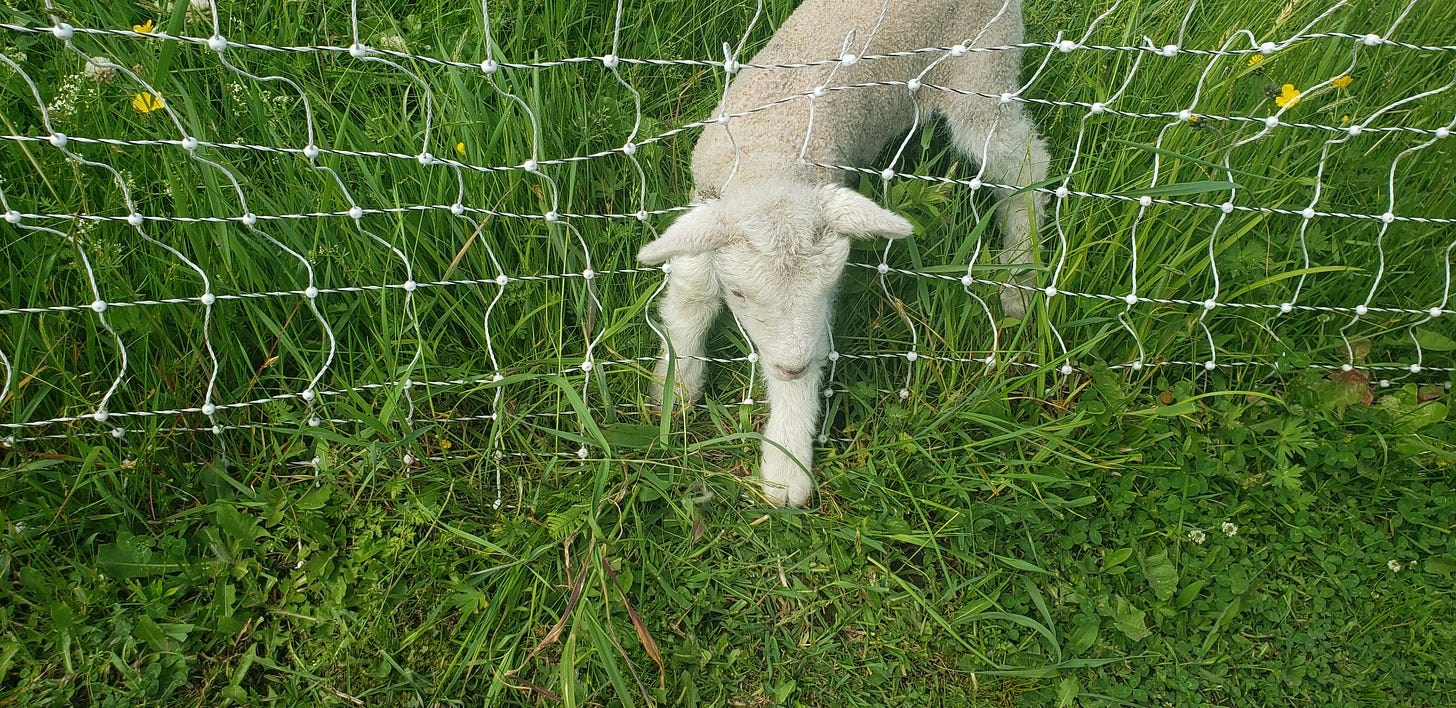
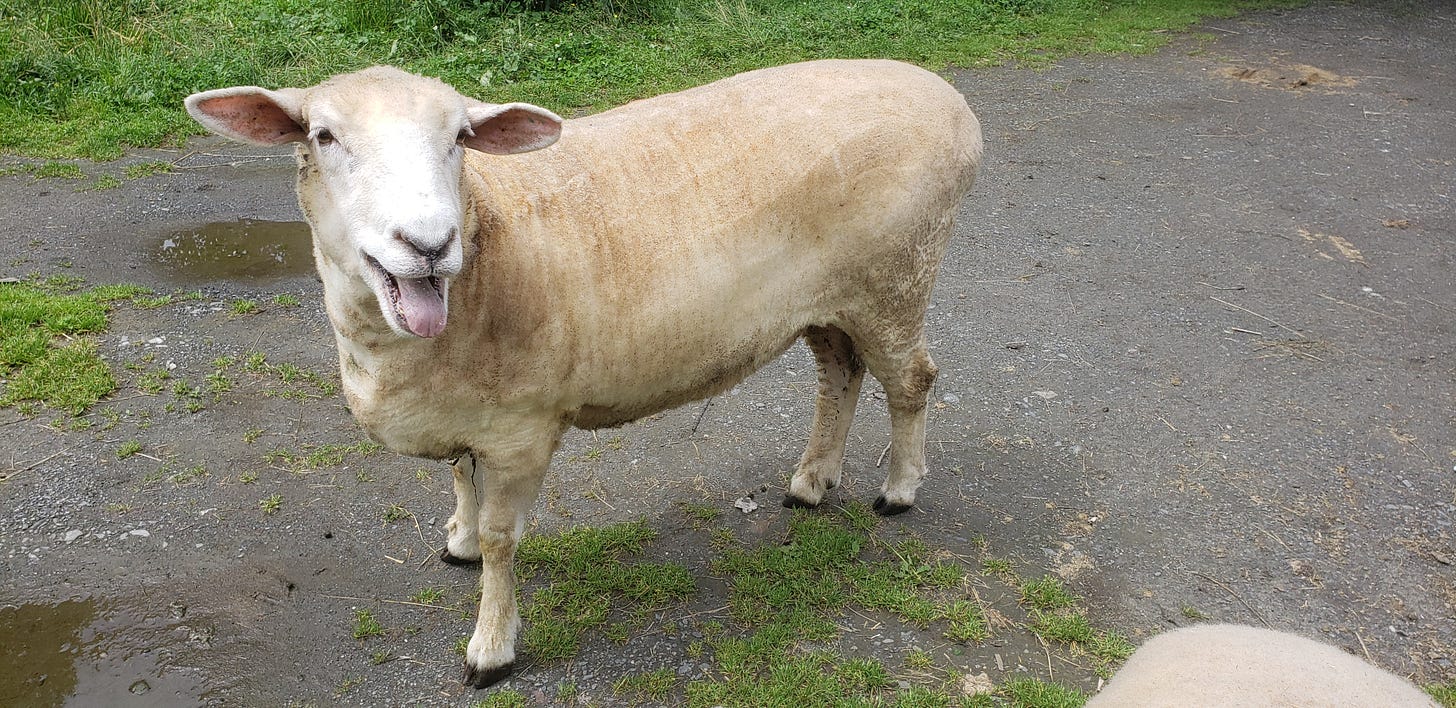
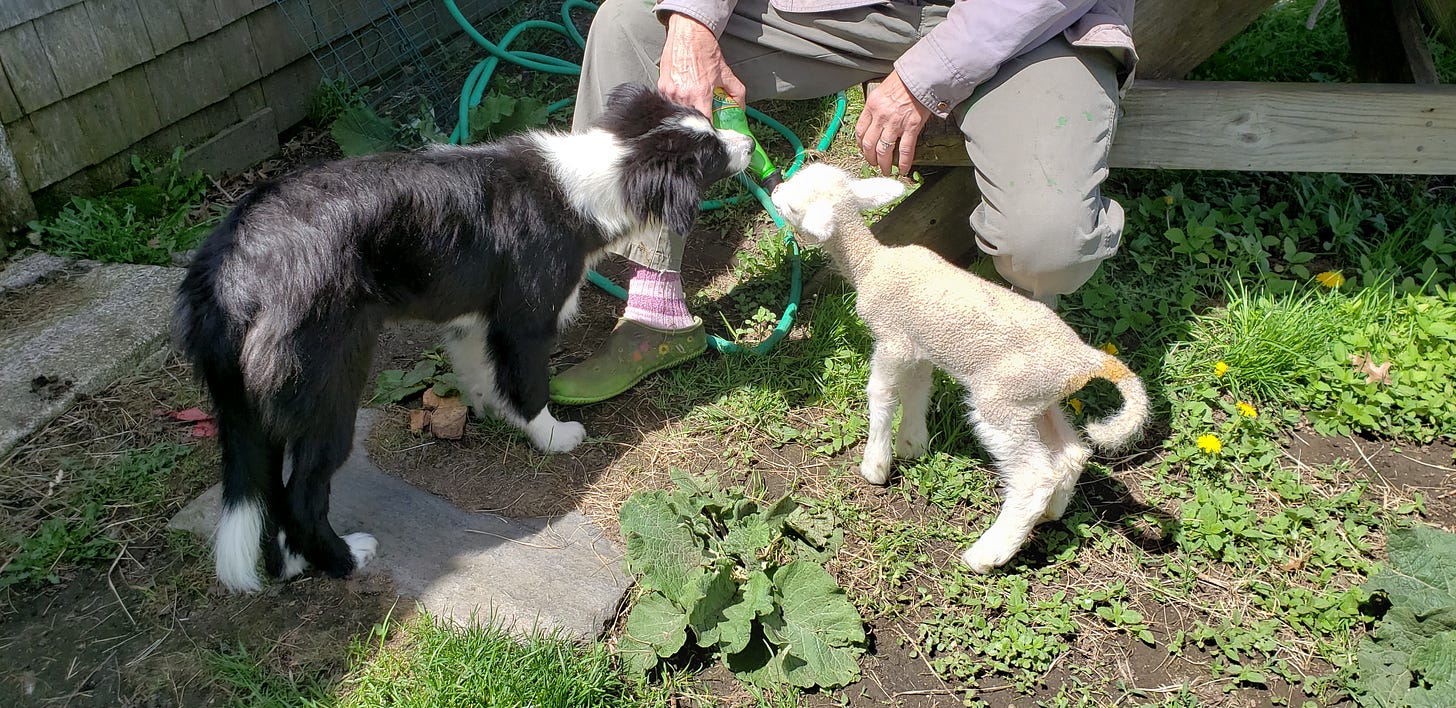
John: This is you at your best: farmer, lawyer, philosopher.
I did take a live pig for slaughter in the back of a VW Beetle. At first all went well. I placed a bucket over the pig's head and backed him up a wooden ramp into the back seat. A few slices of bread to keep the porker content and off I drove with my two boys. I won't bore you with all the details but the brute panicked and landed on my 4 year old and became wedged between the front seat and the dashboard. It took a hammer (not ASPCA approved) to persuade the hog to find a better resting place. The full story has become part of our family lore.